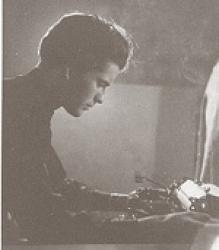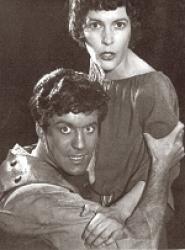Literary Beginnings
 Michael Ende, 1949
Michael Ende, 1949 At drama school in Munich Michael Ende studied for the part of the heroic lover
At drama school in Munich Michael Ende studied for the part of the heroic loverWhen Michael Ende started at the Waldorf school in 1946, he had long since grown out of being a schoolboy. In Stuttgart he first encountered Expressionist and Dadaist writing and began schooling himself in literature. He studied Theodor Däubler, Ivan Goll, Elke Lasker-Schüler and Mombert, but his real love was the poetry of Rainer Maria Rilke, Stefan George and Georg Trakl. In the two years after the war, he made his first attempts at acting, performing with friends in Stuttgart’s America House. He was involved in productions of Chekhov’s one-act comedy The Bear, in which he played the principal role, and in the German premiere of Jean Cocteau’s Orpheus . It was at America House that he met the painter Willi Baumeister.
The German post-war period heralded a rebirth of the theatre. In their thirst for life, people flocked to the theatres and were fascinated by the new ways of seeing the world that it offered. Michael Ende’s first play "Denn die Stunde drängt (As Time is Running Out)" dates back to this period. It was dedicated to Hiroshima, and was never performed.
Michael Ende subsequently described his early plays as ‘much too heavy on pathos (…) and overburdened with philosophy’. In 1947 his close friend Peter Boccarius submitted one of his sonnets to Esslingen’s regional newspaper, and Ende saw his first text - ‘Der Gaukler’ (The Entertainer) - in print. The following year he received a payout of forty marks from the currency reform and was finally able to purchase a guitar. He taught himself to play, and accompanied himself to the lyrics of his poems and songs.
Ende’s first poems and short stories were composed in 1943, but his main goal was to write for the theatre. Financial considerations ruled out a university degree, so he decided to opt for a more practical route into dramaturgy. In 1948 he auditioned for the Otto Falckenberg academy of acting in Munich. His declared intention to study acting in order to be a better playwright must have impressed his examiners, for he was admitted on a two-year scholarship. During his time at the academy he studied classical and modern theories of theatre and was subsequently able to put his knowledge to good use.